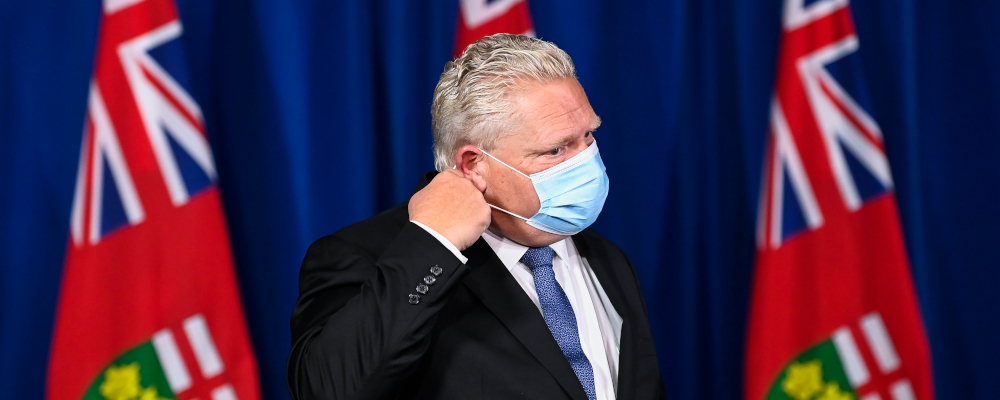It’s hard to remember now, but in April 2021 merely standing outside alone with a mask on and holding up a sign criticizing the government meant risking a $100,000 fine and up to one year in prison. Believe it or not, an Ontario judge has since ruled that this total ban on political protests was justified to stop the spread of COVID-19.
Late last year, Justice Callaghan of the Superior Court of Justice found that the protest ban, part of Premier Doug Ford’s second “stay-at-home order” was a rational limit on the Charter guarantee of freedom of assembly because even though the virus didn’t spread much outdoors, people could spread it while gathering in cars on the way to protests. It was minimally impairing of the right because even though people could still mingle at Costco, attend NHL games, and gather to shoot Netflix crowd scenes, the government was entitled to deference about which kinds of gatherings to prioritize. And it was proportional overall, he found, because the lives saved by lockdowns outweighed the impact on the right.

Justice Callahan didn’t spend much time considering the immense harms from lockdowns that protesters had been trying to draw attention to. Yes, lockdowns prolonged lives, but they also led to overdoses, suicides, job losses, mental health harms, and kids falling behind in math. If rights like freedom of assembly had been better protected going into the pandemic, it’s possible Ontario wouldn’t have made some of the mistakes it made like prioritizing shopping over schools.
To avoid making these kinds of mistakes in the next emergency, we should consider the recommendations made by a panel of experts led by former Reform Party Leader Preston Manning in its November 2023 report prepared for Alberta Premier Danielle Smith. The report has been derided as biased or unrealistic. While it’s true that not all of its suggestions make sense and that many of them align predictably with Smith’s priorities, rather than outright dismissing the report we should be reading it and demanding that every province conduct a similar review. We made too many mistakes to simply move on and pretend like nothing happened.
One obvious but important recommendation from the Manning Report is to take the power to make lockdown decisions away from public health officers and put it clearly back in the hands of elected officials. We know from experience that public health appointees will always choose whatever measures minimize the spread of the virus. Members of cabinet, on the other hand, are held accountable in elections not only for virus spread but also for the harms that public health measures inevitably cause. Democracy demands that elected officials make these tough calls.
The report also recommends that a provincial emergency management agency conduct cost-benefit analyses of emergency proposals and make them public. Cost-benefit analyses would allow us to digest the horrible trade-offs that politicians are presented with and participate in a real-time debate on which policies to pick. If a government’s projections show a three-month lockdown could keep 10,000 seniors alive for six more months but will cause 100,000 working-age people to lose their jobs, a million kids to miss school, and a thousand young people to die from suicides or overdoses, the public deserves to have those grim facts to consider. That’s ultimately a political judgement, not a public health one.
The report also points to research that shows school closures did little to stop the virus but plenty to harm kids. It recommends that schools be deemed an “essential service” so that politicians are legally compelled to close them last. I think most people would agree with that.

The report also suggests, sensibly, that judges be required to hear allegations of rights violations within tight deadlines so that courts can potentially stop the violations while they’re happening.
Some of the recommendations make less sense. For example, it’s far from clear how the province can ban “opinion” discrimination. I also don’t think it’s a good idea to bar courts from awarding costs against people who allege rights violations but then subsequently lose—unless the original claim was frivolous, vexatious, or an abuse of process. This would clog the courts with marginal claims.
But whatever you think of any of the Manning report’s proposals, now is the time for us to study and debate these kinds of questions. If we wait for the next emergency, it will already be too late.
Recommended for You

The Notebook by Theo Argitis: Carney’s One Big Beautiful Tax Cut, and fresh budget lessons from the U.K.

Christopher Snook: Is Canada sleepwalking into dystopia?

Rudyard Griffiths and Sean Speer: The fiscal hangover from the One Big Beautiful Bill hits Canada

‘A fiscal headache for Mark Carney’: The Roundtable on how Trump’s One Big Beautiful Bill could affect Canada



